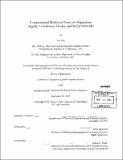| dc.contributor.advisor | Peter Szolovits. | en_US |
| dc.contributor.author | Mui, Lik | en_US |
| dc.contributor.other | Massachusetts Institute of Technology. Department of Electrical Engineering and Computer Science. | en_US |
| dc.date.accessioned | 2014-05-23T19:21:05Z | |
| dc.date.available | 2014-05-23T19:21:05Z | |
| dc.date.copyright | 2002 | en_US |
| dc.date.issued | 2003 | en_US |
| dc.identifier.uri | http://hdl.handle.net/1721.1/87343 | |
| dc.description | Thesis (Ph. D.)--Massachusetts Institute of Technology, Dept. of Electrical Engineering and Computer Science, February 2003. | en_US |
| dc.description | Includes bibliographical references (leaves [131]-139). | en_US |
| dc.description.abstract | Many recent studies of trust and reputation are made in the context of commercial reputation or rating systems for online communities. Most of these systems have been constructed without a formal rating model or much regard for our sociological understanding of these concepts. We first provide a critical overview of the state of research on trust and reputation. We then propose a formal quantitative model for the rating process. Based on this model, we formulate two personalized rating schemes and demonstrate their effectiveness at inferring trust experimentally using a simulated dataset and a real world movie-rating dataset. Our experiments show that the popular global rating scheme widely used in commercial electronic communities is inferior to our personalized rating schemes when sufficient ratings among members are available. The level of sufficiency is then discussed. In comparison with other models of reputation, we quantitatively show that our framework provides significantly better estimations of reputation. "Better" is discussed with respect to a rating process and specific games as defined in this work. Secondly, we propose a mathematical framework for modeling trust and reputation that is rooted in findings from the social sciences. In particular, our framework makes explicit the importance of social information (i.e., indirect channels of inference) in aiding members of a social network choose whom they want to partner with or to avoid. Rating systems that make use of such indirect channels of inference are necessarily personalized in nature, catering to the individual context of the rater. Finally, we have extended our trust and reputation framework toward addressing a fundamental problem for social science and biology: evolution of cooperation. | en_US |
| dc.description.abstract | (cont.) We show that by providing an indirect inference mechanism for the propagation of trust and reputation, cooperation among selfish agents can be explained for a set of game theoretic simulations. For these simulations in particular, our proposal is shown to have provided more cooperative agent communities than existing schemes are able to. | en_US |
| dc.description.statementofresponsibility | by Lik Mui. | en_US |
| dc.format.extent | 139 leaves | en_US |
| dc.language.iso | eng | en_US |
| dc.publisher | Massachusetts Institute of Technology | en_US |
| dc.rights | M.I.T. theses are protected by copyright. They may be viewed from this source for any purpose, but reproduction or distribution in any format is prohibited without written permission. See provided URL for inquiries about permission. | en_US |
| dc.rights.uri | http://dspace.mit.edu/handle/1721.1/7582 | en_US |
| dc.subject | Electrical Engineering and Computer Science. | en_US |
| dc.title | Computational models of trust and reputation : agents, evolutionary games, and social networks | en_US |
| dc.type | Thesis | en_US |
| dc.description.degree | Ph.D. | en_US |
| dc.contributor.department | Massachusetts Institute of Technology. Department of Electrical Engineering and Computer Science | |
| dc.identifier.oclc | 52699764 | en_US |
